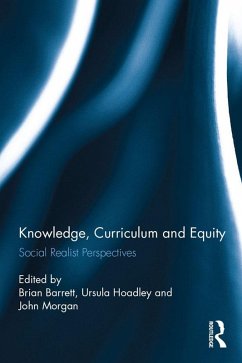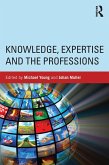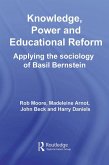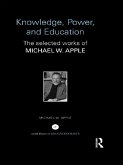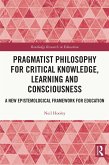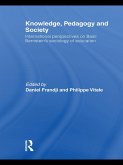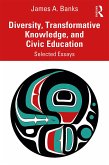Knowledge, Curriculum and Equity (eBook, ePUB)
Social Realist Perspectives
Redaktion: Barrett, Brian; Morgan, John; Hoadley, Ursula
40,95 €
40,95 €
inkl. MwSt.
Sofort per Download lieferbar

20 °P sammeln
40,95 €
Als Download kaufen

40,95 €
inkl. MwSt.
Sofort per Download lieferbar

20 °P sammeln
Jetzt verschenken
Alle Infos zum eBook verschenken
40,95 €
inkl. MwSt.
Sofort per Download lieferbar
Alle Infos zum eBook verschenken

20 °P sammeln
Knowledge, Curriculum and Equity (eBook, ePUB)
Social Realist Perspectives
Redaktion: Barrett, Brian; Morgan, John; Hoadley, Ursula
- Format: ePub
- Merkliste
- Auf die Merkliste
- Bewerten Bewerten
- Teilen
- Produkt teilen
- Produkterinnerung
- Produkterinnerung

Bitte loggen Sie sich zunächst in Ihr Kundenkonto ein oder registrieren Sie sich bei
bücher.de, um das eBook-Abo tolino select nutzen zu können.
Hier können Sie sich einloggen
Hier können Sie sich einloggen
Sie sind bereits eingeloggt. Klicken Sie auf 2. tolino select Abo, um fortzufahren.

Bitte loggen Sie sich zunächst in Ihr Kundenkonto ein oder registrieren Sie sich bei bücher.de, um das eBook-Abo tolino select nutzen zu können.
Knowledge, Curriculum and Equity: Social Realist Perspectives contains the work of the third in a series of symposia on the 'social realist' case for 'knowledge' in the educational curriculum. The strengths and gaps of the approach are identified and there is critical recognition of the need to incrementally extend the theories through empirical study.
- Geräte: eReader
- mit Kopierschutz
- eBook Hilfe
- Größe: 1.65MB
Andere Kunden interessierten sich auch für
![Knowledge, Expertise and the Professions (eBook, ePUB) Knowledge, Expertise and the Professions (eBook, ePUB)]() Knowledge, Expertise and the Professions (eBook, ePUB)49,95 €
Knowledge, Expertise and the Professions (eBook, ePUB)49,95 €![Knowledge, Power and Educational Reform (eBook, ePUB) Knowledge, Power and Educational Reform (eBook, ePUB)]() Knowledge, Power and Educational Reform (eBook, ePUB)54,95 €
Knowledge, Power and Educational Reform (eBook, ePUB)54,95 €![Knowledge, Power, and Education (eBook, ePUB) Knowledge, Power, and Education (eBook, ePUB)]() Knowledge, Power, and Education (eBook, ePUB)54,95 €
Knowledge, Power, and Education (eBook, ePUB)54,95 €![Pragmatist Philosophy for Critical Knowledge, Learning and Consciousness (eBook, ePUB) Pragmatist Philosophy for Critical Knowledge, Learning and Consciousness (eBook, ePUB)]() Neil HooleyPragmatist Philosophy for Critical Knowledge, Learning and Consciousness (eBook, ePUB)42,95 €
Neil HooleyPragmatist Philosophy for Critical Knowledge, Learning and Consciousness (eBook, ePUB)42,95 €![Knowledge, Pedagogy and Society (eBook, ePUB) Knowledge, Pedagogy and Society (eBook, ePUB)]() Knowledge, Pedagogy and Society (eBook, ePUB)51,95 €
Knowledge, Pedagogy and Society (eBook, ePUB)51,95 €![Diversity, Transformative Knowledge, and Civic Education (eBook, ePUB) Diversity, Transformative Knowledge, and Civic Education (eBook, ePUB)]() James A. BanksDiversity, Transformative Knowledge, and Civic Education (eBook, ePUB)42,95 €
James A. BanksDiversity, Transformative Knowledge, and Civic Education (eBook, ePUB)42,95 €![Curriculum Epistemicide (eBook, ePUB) Curriculum Epistemicide (eBook, ePUB)]() João M. ParaskevaCurriculum Epistemicide (eBook, ePUB)36,95 €
João M. ParaskevaCurriculum Epistemicide (eBook, ePUB)36,95 €-
-
-
Knowledge, Curriculum and Equity: Social Realist Perspectives contains the work of the third in a series of symposia on the 'social realist' case for 'knowledge' in the educational curriculum. The strengths and gaps of the approach are identified and there is critical recognition of the need to incrementally extend the theories through empirical study.
Dieser Download kann aus rechtlichen Gründen nur mit Rechnungsadresse in A, B, BG, CY, CZ, D, DK, EW, E, FIN, F, GR, HR, H, IRL, I, LT, L, LR, M, NL, PL, P, R, S, SLO, SK ausgeliefert werden.
Produktdetails
- Produktdetails
- Verlag: Taylor & Francis eBooks
- Seitenzahl: 240
- Erscheinungstermin: 20. Juli 2017
- Englisch
- ISBN-13: 9781351618823
- Artikelnr.: 49984469
- Verlag: Taylor & Francis eBooks
- Seitenzahl: 240
- Erscheinungstermin: 20. Juli 2017
- Englisch
- ISBN-13: 9781351618823
- Artikelnr.: 49984469
- Herstellerkennzeichnung Die Herstellerinformationen sind derzeit nicht verfügbar.
Brian Barrett is associate professor in the Foundations and Social Advocacy Department and graduate research coordinator with SUNY Cortland's Urban Recruitment of Educators program. Ursula Hoadley is an Associate Professor working in the School of Education at the University of Cape Town. Her work focuses on pedagogy, curriculum and school organisation at the primary level, and she has published extensively both locally and internationally in these areas. John Morgan is Professor of Education at the University of Auckland. His research interests are in geographical education, the politics of the school curriculum and the cultural politics of schooling.
Foreword From 'social realism' to 'knowledge in education' Michael Young
Chapter 1. Introduction: social realist perspectives on knowledge,
curriculum and equity John Morgan, Ursula Hoadley and Brian Barrett
Section 1. Knowledge, curriculum and the social realist project
Chapter 2. Connecting knowledge to democracy Elizabeth Rata
Chapter 3. For knowledge - but what knowledge? Confronting social realism's
curriculum problem John Morgan and David Lambert
Chapter 4. History as knowledge: humanities challenges for a
knowledge-based curriculum Lyn Yates
Section 2. Knowledge and the structuring of the curriculum
Chapter 5. A theoretical model of curriculum design: 'Powerful Knowledge'
and '21st Century Learning' Graham McPhail and Elizabeth Rata
Chapter 6. Pedagogic modality and structure in the recontextualising field
of curriculum studies: the South African case Johan Muller and Ursula
Hoadley
Chapter 7. Conceptions of knowledge in history teaching Barbara Ormond
Section 3. Curriculum structure and its effects
Chapter 8. Teacher change in a changing moral order: learning from Durkheim
Lynne Slonimsky
Chapter 9. Delocating and relocating knowledge: the dynamics of curriculum
change in Singapore Leonel Lim
Chapter 10. Recontextualisation and professionalising regions Jim Hordern
Section 4. Pedagogy and the structuring of knowedge
Chapter 11. Flipping the script: teachers' perceptions of tensions and
possibilities within a scripted curriculum Brian Barrett, Anne Burns Thomas
and Maria Timberlake
Chapter 12. Scripted lesson plans - what is visible and invisible in
visible pedagogy? Yael Shalem
Chapter 13. Pedagogic modalities and the ritualising of pedagogy Zain Davis
and Paula Ensor
Chapter 1. Introduction: social realist perspectives on knowledge,
curriculum and equity John Morgan, Ursula Hoadley and Brian Barrett
Section 1. Knowledge, curriculum and the social realist project
Chapter 2. Connecting knowledge to democracy Elizabeth Rata
Chapter 3. For knowledge - but what knowledge? Confronting social realism's
curriculum problem John Morgan and David Lambert
Chapter 4. History as knowledge: humanities challenges for a
knowledge-based curriculum Lyn Yates
Section 2. Knowledge and the structuring of the curriculum
Chapter 5. A theoretical model of curriculum design: 'Powerful Knowledge'
and '21st Century Learning' Graham McPhail and Elizabeth Rata
Chapter 6. Pedagogic modality and structure in the recontextualising field
of curriculum studies: the South African case Johan Muller and Ursula
Hoadley
Chapter 7. Conceptions of knowledge in history teaching Barbara Ormond
Section 3. Curriculum structure and its effects
Chapter 8. Teacher change in a changing moral order: learning from Durkheim
Lynne Slonimsky
Chapter 9. Delocating and relocating knowledge: the dynamics of curriculum
change in Singapore Leonel Lim
Chapter 10. Recontextualisation and professionalising regions Jim Hordern
Section 4. Pedagogy and the structuring of knowedge
Chapter 11. Flipping the script: teachers' perceptions of tensions and
possibilities within a scripted curriculum Brian Barrett, Anne Burns Thomas
and Maria Timberlake
Chapter 12. Scripted lesson plans - what is visible and invisible in
visible pedagogy? Yael Shalem
Chapter 13. Pedagogic modalities and the ritualising of pedagogy Zain Davis
and Paula Ensor
Foreword From 'social realism' to 'knowledge in education' Michael Young
Chapter 1. Introduction: social realist perspectives on knowledge,
curriculum and equity John Morgan, Ursula Hoadley and Brian Barrett
Section 1. Knowledge, curriculum and the social realist project
Chapter 2. Connecting knowledge to democracy Elizabeth Rata
Chapter 3. For knowledge - but what knowledge? Confronting social realism's
curriculum problem John Morgan and David Lambert
Chapter 4. History as knowledge: humanities challenges for a
knowledge-based curriculum Lyn Yates
Section 2. Knowledge and the structuring of the curriculum
Chapter 5. A theoretical model of curriculum design: 'Powerful Knowledge'
and '21st Century Learning' Graham McPhail and Elizabeth Rata
Chapter 6. Pedagogic modality and structure in the recontextualising field
of curriculum studies: the South African case Johan Muller and Ursula
Hoadley
Chapter 7. Conceptions of knowledge in history teaching Barbara Ormond
Section 3. Curriculum structure and its effects
Chapter 8. Teacher change in a changing moral order: learning from Durkheim
Lynne Slonimsky
Chapter 9. Delocating and relocating knowledge: the dynamics of curriculum
change in Singapore Leonel Lim
Chapter 10. Recontextualisation and professionalising regions Jim Hordern
Section 4. Pedagogy and the structuring of knowedge
Chapter 11. Flipping the script: teachers' perceptions of tensions and
possibilities within a scripted curriculum Brian Barrett, Anne Burns Thomas
and Maria Timberlake
Chapter 12. Scripted lesson plans - what is visible and invisible in
visible pedagogy? Yael Shalem
Chapter 13. Pedagogic modalities and the ritualising of pedagogy Zain Davis
and Paula Ensor
Chapter 1. Introduction: social realist perspectives on knowledge,
curriculum and equity John Morgan, Ursula Hoadley and Brian Barrett
Section 1. Knowledge, curriculum and the social realist project
Chapter 2. Connecting knowledge to democracy Elizabeth Rata
Chapter 3. For knowledge - but what knowledge? Confronting social realism's
curriculum problem John Morgan and David Lambert
Chapter 4. History as knowledge: humanities challenges for a
knowledge-based curriculum Lyn Yates
Section 2. Knowledge and the structuring of the curriculum
Chapter 5. A theoretical model of curriculum design: 'Powerful Knowledge'
and '21st Century Learning' Graham McPhail and Elizabeth Rata
Chapter 6. Pedagogic modality and structure in the recontextualising field
of curriculum studies: the South African case Johan Muller and Ursula
Hoadley
Chapter 7. Conceptions of knowledge in history teaching Barbara Ormond
Section 3. Curriculum structure and its effects
Chapter 8. Teacher change in a changing moral order: learning from Durkheim
Lynne Slonimsky
Chapter 9. Delocating and relocating knowledge: the dynamics of curriculum
change in Singapore Leonel Lim
Chapter 10. Recontextualisation and professionalising regions Jim Hordern
Section 4. Pedagogy and the structuring of knowedge
Chapter 11. Flipping the script: teachers' perceptions of tensions and
possibilities within a scripted curriculum Brian Barrett, Anne Burns Thomas
and Maria Timberlake
Chapter 12. Scripted lesson plans - what is visible and invisible in
visible pedagogy? Yael Shalem
Chapter 13. Pedagogic modalities and the ritualising of pedagogy Zain Davis
and Paula Ensor
